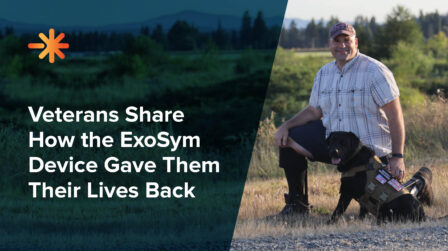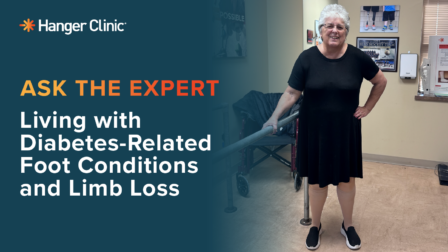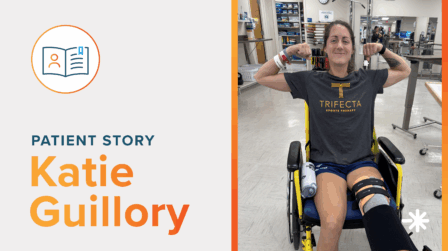Amputation Considerations
While facing limb loss can feel overwhelming, understanding the many different aspects of recovery may help you achieve success.
The loss of a limb is a life-changing experience. It can be a tremendous physical loss and, in many cases, emotionally devastating. The keys to getting back your lifestyle after amputation are to take it one moment at a time and to try and enjoy every little success and accomplishment along the way.
Here’s what you can expect as you enter the rehabilitation and recovery process.
Protect Your Limb
When prescribed by your physicians, the use of a limb protector immediately after surgery will help manage swelling and accelerate healing to better prepare you for your first prosthetic fitting. Ask your doctor about AmpuShield® limb protectors, which can be customized to your individual needs.
Take Care of Your Residual Limb
Keeping a close eye on your skin is the best way to identify any problems. Inspect your skin on a daily basis and look for any changes. Pay attention to your skin’s temperature and color. Look for signs of broken tissue, blisters, tears, scratches, or cuts. Remember to inspect all creases and bony areas, and use a mirror to look underneath your limb. If you notice any changes to your skin, notify your rehab team immediately.
Phantom Pain
One of the early challenges following amputation can be dealing with phantom limb sensation or pain. The experience of phantom pain varies for different individuals, and has been described as cramping, aching, burning, or a shock-like sensation. There are many different therapies that may help, including biofeedback, pharmaceuticals, and surgery. If you struggle with phantom pain, keep a log of when it occurs, and try to identify and eliminate any triggers. Take your log to your physician, and they can recommend the best treatment plan for you.
Physical Therapy
Physical therapy may be part of your recovery. During the early stages, your physical therapist may recommend exercises to condition and strengthen your residual limb. You may also learn the skills necessary for early mobility, including simple position changes. These might include transferring from bed to chair, getting to the toilet or shower, balancing while standing, and learning to use crutches or a wheelchair.
Home Exercises and Stretching
Allowing the muscles of your leg to tighten up after an amputation may make it more difficult for you to wear your prosthesis. These contractures can affect your gait and in extreme cases, may keep you from walking at all. Doing daily strengthening and stretching exercises at home will help improve your flexibility and prevent contractures.
Rely on Your Care Team
Rehabilitation depends on the combined efforts of many people. Your care team may also include your physician(s), prosthetist, physical therapist, occupational therapist, and possibly a psychologist/counselor. The best outcomes are achieved when you ask questions, say what you are thinking, and engage with your care team to clearly discuss options and issues.
Attitude and Focus
Patience, persistence, and positivity are essential to adjusting to your new normal. Focus on setting continuous, tangible goals that can be realistically achieved within a set time frame. As you find success along the way, you will feel empowered to continue on to the next step of your journey.
Time and Self-Education
You are on your own individual journey. Take your time, and give yourself a chance to learn. Educate yourself on prosthetic components—learn what they can do and apply that to what you want to accomplish. Find a prosthetist who will take the time to listen and understand where you are as a patient and a person.
Spend Time on Your Health
This is a great time to get healthier. If needed, talk with a nutritionist about a weight loss plan. If you are diabetic, follow your medication and food schedule. Monitor your blood sugar, blood pressure, cholesterol, and weight.
Get to Know Other Amputees
Find inspiration and support from others who have faced similar challenges by connecting with a certified peer mentor or attending a local or national event where you can meet and engage with others who are at the same stage as you or further along in their prosthetic journey.
Don’t Forget to Celebrate
Did you reach a goal or do something new? Acknowledge it by celebrating!
Get in Touch
If you have questions, want more information about Hanger Clinic services, or would like to schedule a free evaluation, reach out to us today.

Latest Updates
Subscribe to stay up-to-date on our latest posts.


